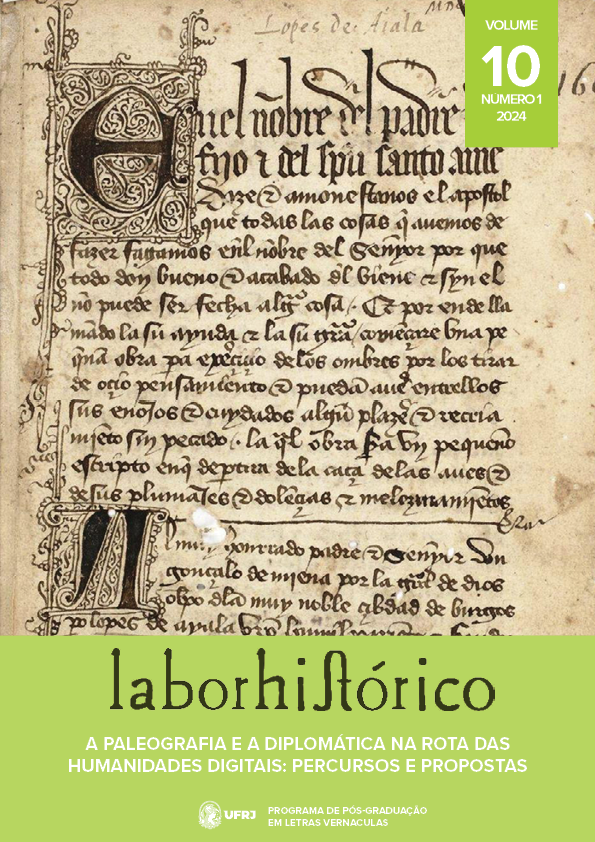The Inquisition Studies during the Covid Era: The Importance of Digital Archives and Libraries
DOI:
https://doi.org/10.24206/lh.v10i1.63289Keywords:
Inquisición española, Archivística, Historiografía, Digitalización.Abstract
After the COVID-19 pandemic breaking out in 2020, how could we continue our investigations when universities, libraries, archives and museums were closed and the population was unable to leave their homes other than to carry out essential tasks? That is when a paradigm shift occurs. The sources of our investigations, at least for a time, had to stop being physical, to became virtual. Digitized documents become important and indispensable for study and analysis. Historical science has not remained oblivious to all this and has used this new way of going to texts, previously despised, now essential, but, would it be possible to make viable studies in this field of knowledge based on digitized sources? What can we really find on the internet? In this article I will focus on a specific case and institution, that of the Spanish Inquisition, trying to guide potential readers through different archive and library web pages that have taken the step of offering free and open access to their collections, if not totally, at least partially, giving the opportunity to use them at any time and from anywhere.
References
AVILÉS FERNÁNDEZ, Miguel (2000). Fuentes y técnicas del conocimiento histórico del Santo Oficio. Los fondos manuscritos: los depósitos de papeles inquisitoriales. Los fondos extranjeros. In: ESCANDELL BONET, Bartolomé; PÉREZ VILLANUEVA, Joaquín (dirs.) (2000) . Historia de la Inquisición en España y América. Vol. I (El conocimiento científico y el proceso histórico de la institución (1478-1834). Madrid: Biblioteca de Autores Cristianos, p. 83-89.
BALLESTEROS GAIBROIS, Manuel (2000). Fuentes y técnicas del conocimiento histórico del Santo Oficio. Los fondos manuscritos: los depósitos de papeles inquisitoriales. Los fondos inquisitoriales americanísticos. In: ESCANDELL BONET, Bartolomé; PÉREZ VILLANUEVA, Joaquín (dirs.) (2000). Historia de la Inquisición en España y América. Vol. I (El conocimiento científico y el proceso histórico de la institución (1478-1834). Madrid: Biblioteca de Autores Cristianos, p. 90-135.
DEDIEU, Jean-Pierre (2011). The Spanish inquisition. Current research in perspective. Atti dei convegni Lincei. Roma: Academia Nazionale dei Lincei, p. 51-69.
DEDIEU, Jean-Pierre (2013). “Inquisizione spagnola: Fonti e archivi“. Dizionario di eretici, dissidenti e inquisitori nel mondo mediterraneo [Em linha]. Firenze: Edizioni CLORI: http://www.ereticopedia.org/archivi-inquisizione-spagnola [última consulta: 31 de octubre de 2021].
ESCANDELL BONET, Bartolomé; PÉREZ VILLANUEVA, Joaquín (dirs.) (2000). Historia de la Inquisición en España y América. Vol. I (El conocimiento científico y el proceso histórico de la institución (1478-1834). Madrid: Biblioteca de Autores Cristianos.
GRANDA LORENZO, Sandra (2009). Henry Charles Lea y su aportación a la historiografia. Revista de la Inquisición (Intolerancia y derechos humanos). Madrid. Vol. 13, p. 117-194.
HENNINGSEN, Gustav (1977). La colección de Moldenhawer en Copenhague: Una aportación a la archivología de la Inquisición española. Revista de Archivos, Bibliotecas y Museos. Vol. LXXX, núm. 2 (abril-junio), p. 209-270.
HENNINGSEN, Gustav (1988). ¿Por qué estudiar la Inquisición? Reflexiones sobre la historiografía reciente y el futuro de una disciplina. Manuscrits. Vol. 7, p. 35-50.
HENNINGSEN, Gustav (2020). Archivos e historiografía de la Inquisición española. Príncipe de Viana (PV), 278 (septiembre-diciembre), p. 975-998.
LANE, Kris; MILLS, Kenneth (2020). Beyond index and auto de fe: New directions in the study of the Holy Office of the Inquisition. Colonial Latin American Review. Vol. 29, nº 3, p. 351-356.
LLAMAS MARTÍNEZ, Enrique. Documentación inquisitorial. Manuscritos españoles del siglo XVI existentes en el Museo Británico. Madrid: Fundación Universitaria Española.
LÓPEZ-SALAZAR CODES, Ana Isabel (2012). La relación entre las Inquisiciones de España y Portugal en los siglos XVI y XVII: objetivos, estrategias y tensiones. Espacio, Tiempo y Forma. Serie IV, Historia Moderna. Núm. 25, p. 223-252.
MARTÍNEZ MILLÁN, José (2000). Fuentes y técnicas del conocimiento histórico del Santo Oficio. Los fondos manuscritos: los depósitos de papeles inquisitoriales. Las fuentes impresas. In: ESCANDELL BONET, Bartolomé; PÉREZ VILLANUEVA, Joaquín (dirs.) (2000). Historia de la Inquisición en España y América. Vol. I (El conocimiento científico y el proceso histórico de la institución (1478-1834). Madrid: Biblioteca de Autores Cristianos p. 136-138.
PÉREZ RAMÍREZ, Dimas (2000). Fuentes y técnicas del conocimiento histórico del Santo Oficio. Los fondos manuscritos: los depósitos de papeles inquisitoriales. Archivos regionales y locales. In: ESCANDELL BONET, Bartolomé; PÉREZ VILLANUEVA, Joaquín (dirs.) (2000). Historia de la Inquisición en España y América. Vol. I (El conocimiento científico y el proceso histórico de la institución (1478-1834). Madrid: Biblioteca de Autores Cristianos, p. 78-82.
PINTO CRESPO, Virgilio (2000). Fuentes y técnicas del conocimiento histórico del Santo Oficio. Los fondos manuscritos: los depósitos de papeles inquisitoriales. Archivos nacionales españoles. In: ESCANDELL BONET, Bartolomé; PÉREZ VILLANUEVA, Joaquín (dirs.) (2000). Historia de la Inquisición en España y América. Vol. I (El conocimiento científico y el proceso histórico de la institución (1478-1834). Madrid: Biblioteca de Autores Cristianos, p. 58-77.
Downloads
Published
Issue
Section
License
Copyright (c) 2024 Bárbara Santiago Medina

This work is licensed under a Creative Commons Attribution-NonCommercial 4.0 International License.
Authors who publish with this journal agree to the following:
a. The authors hold copyright of the published papers; authors are the sole responsible party for published papers content; the published paper is licensed under a Creative Commons Attribution-NonCommercial 4.0 International License which allows the sharing of the publication as long as there is acknowledgement of authorship and publishing by Revista LaborHistórico.
b. Authors should seek previous permission from the journal in order to publish their articles as book chapters. Such publications should acknowledge first publishing by LaborHistórico.
c. Authors may publish and distribute their papers (for example, at institutional repositories, author's sites) at any time during or after the editorial process by Revista LaborHistórico.


